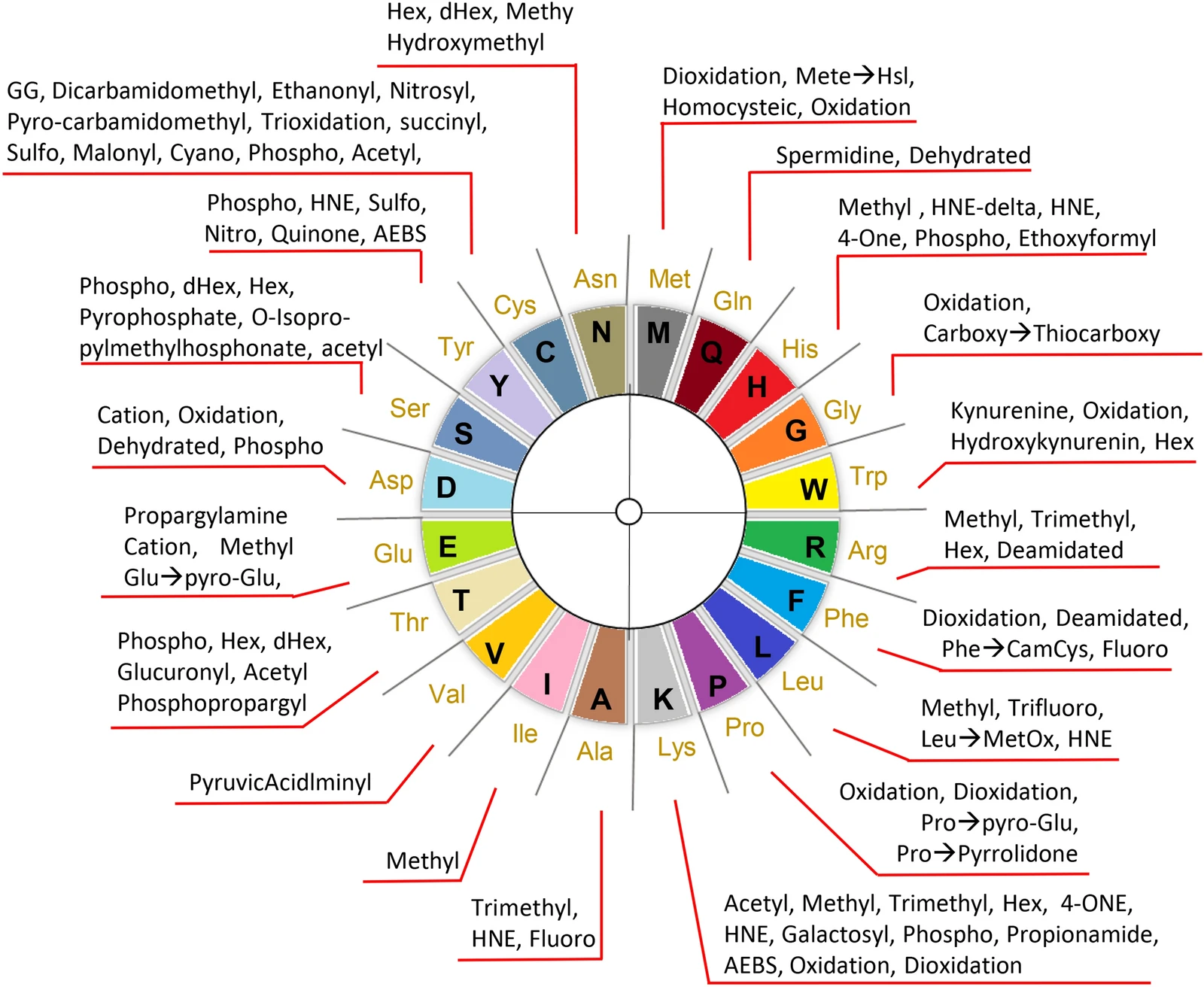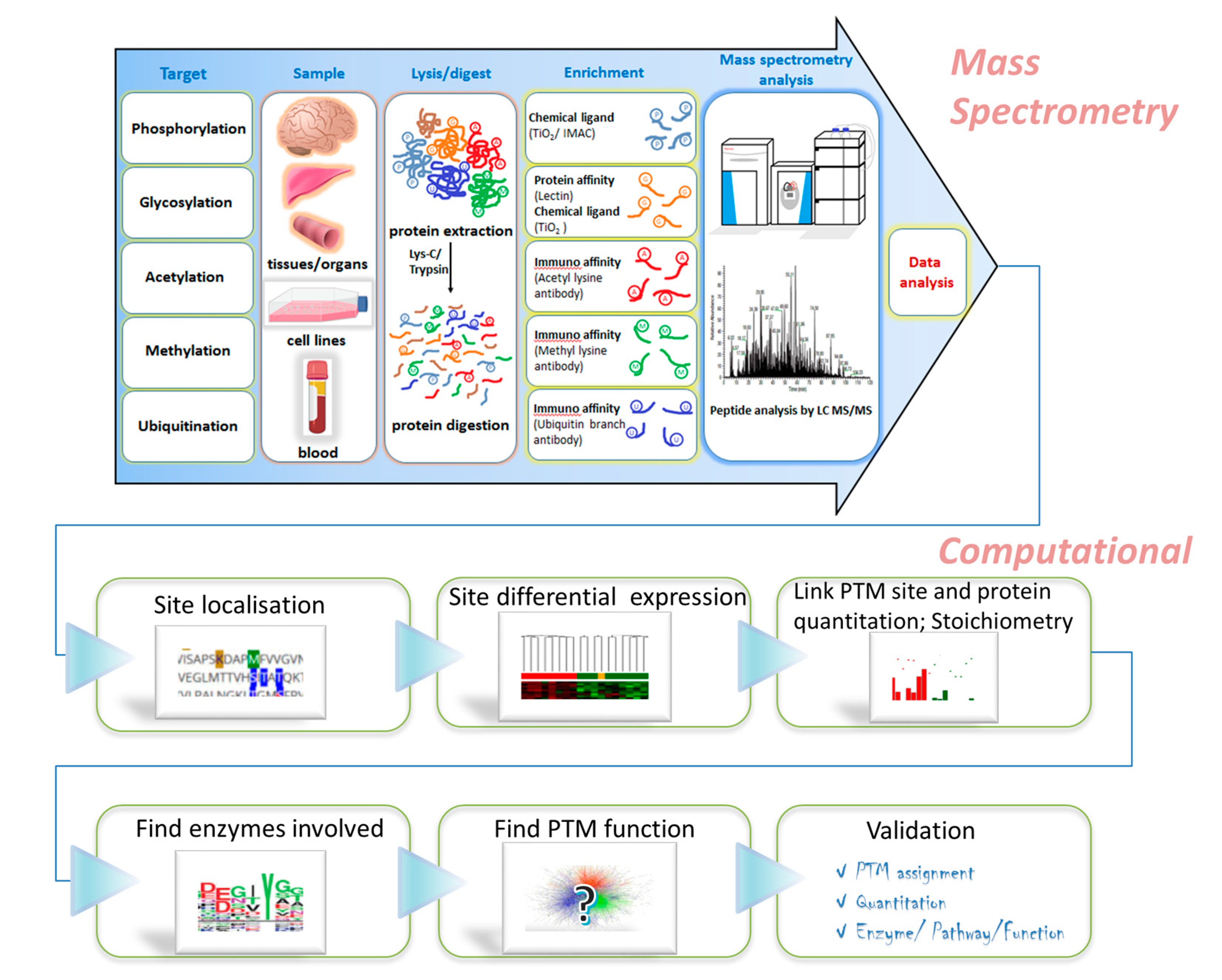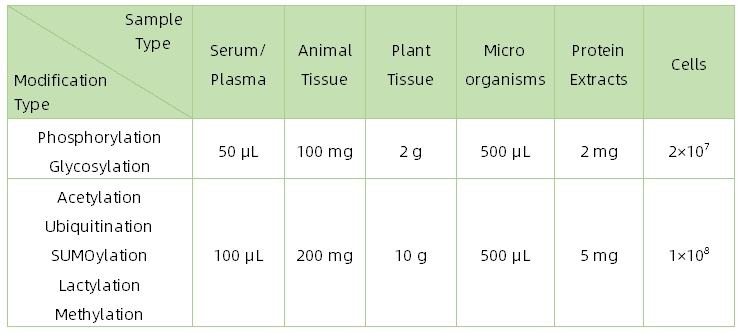Global PTMs Profiling Service
Based on a high-resolution mass spectrometry (LC-MS/MS) platform and multidimensional peptide enrichment technologies, MtoZ Biolabs has developed the global PTMs profiling service to enable comprehensive identification and quantitative analysis of multiple protein post-translational modifications. This service integrates strategies such as IMAC, TiO₂, and antibody-based enrichment, covering various modification types including phosphorylation, acetylation, ubiquitination, and malonylation. Through precise mass spectrometric detection and database matching, MtoZ Biolabs provides high-confidence modification site identification, quantitative differential analysis, and functional annotation data, offering researchers robust data support for elucidating protein modification networks.
Overview
Global post-translational modifications (PTMs) proteomics is a scientific field dedicated to the systematic study of diverse chemical modifications that occur on proteins after translation. PTMs play essential roles in regulating protein structure, activity, localization, and interactions, forming a fundamental basis for understanding cellular signaling, metabolic regulation, and stress responses. Through global PTMs analysis, researchers can simultaneously identify and quantify multiple types of modifications, uncover complex regulatory networks and dynamic changes, and apply these findings broadly in biological research, drug development, molecular target discovery, and biomarker studies.

Bagwan, N. et al. Scientific Reports, 2021.
Figure 1. Representation of the Post Translational Modifications and Their Distribution Across Amino Acids.
Analysis Workflow
1. Protein Extraction and Digestion
Total proteins are extracted from cell, tissue, or plasma samples and digested with proteases to obtain peptide mixtures.
2. Modified Peptide Enrichment
IMAC, TiO₂, antibody affinity, or chemical derivatization strategies are employed to enrich modified peptides.
3. Mass Spectrometry Detection and Data Acquisition
High-resolution LC-MS/MS is used for detection, and multi-stage fragmentation spectra are acquired for precise identification.
4. Data Analysis
Database searching and algorithmic analysis are applied to locate modification sites and perform quantitative analysis of different PTM types.
5. Functional Annotation and Report Generation
Modification profiling data are integrated for functional enrichment and pathway analysis, and standardized result reports are generated.

Pascovici, D. et al. International Journal of Molecular Sciences, 2019.
Figure 2. Schematic PTM Workflow.
Sample Submission Suggestions
1. Sample Type and Quantity

2. Sample Storage
Samples should be sealed and protected from light at -80°C for long-term storage, or kept at -20°C for short-term preservation. Repeated freeze-thaw cycles should be avoided to prevent protein degradation and loss of modifications.
3. Sample Transportation
Liquid samples should be transported under cold-chain conditions, while lyophilized samples can be shipped at room temperature for short periods. High temperature, humidity, and direct light exposure should be avoided.
Note: Samples should maintain good integrity, and buffers containing high salt concentrations or surfactants should be avoided to ensure the accuracy and stability of mass spectrometry analysis.
Service Advantages
1. High-Resolution Detection Platform
Equipped with advanced LC-MS/MS systems, enabling highly sensitive detection and precise quantification of multiple post-translational modifications.
2. High-Specificity Enrichment Strategies
Utilizing various enrichment methods such as IMAC, TiO₂, and antibody affinity based on modification types to enhance modification coverage.
3. Customized Research Solutions
Experimental workflows are flexibly designed according to research goals and project needs to meet diverse analytical requirements.
4. One-Stop Service Workflow
Providing end-to-end solutions from sample processing to data analysis, ensuring efficient and time-saving research execution.
Applications
1. Protein Function Research
Through systematic analysis of multiple post-translational modifications, the service helps reveal the roles of PTMs in protein structural stability and functional regulation.
2. Signal Pathway Investigation
Global PTMs profiling service can identify key modification sites involved in signal transduction and elucidate complex regulatory networks.
3. Metabolic Regulation Analysis
By comparing modification changes under different physiological or environmental conditions, the service evaluates dynamic regulatory features in metabolic pathways.
4. Biomarker Discovery
Global PTMs profiling service can uncover characteristic modifications associated with physiological states or treatment responses, facilitating the identification of potential biomarkers.
FAQ
Q1: Can Modification Differences between Samples Be Quantitatively Analyzed?
A1: Yes. MtoZ Biolabs provides quantitative strategies based on TMT, iTRAQ, or Label-Free approaches to compare modification level changes across different samples or treatment conditions.
Q2: What Is the Difference between Global PTMs Profiling and Single-Modification Proteomics Studies?
A2: Single-modification studies focus on a specific type of modification, while Global PTMs Profiling can systematically identify multiple modification types in a single experiment, revealing interactions and regulatory relationships among different PTMs.
Q3: Can Global PTMs Profiling Be Integrated with Other Omics Data?
A3: Yes. Global PTMs Profiling can be combined with proteomics, metabolomics, and transcriptomics datasets to construct comprehensive regulatory models.







